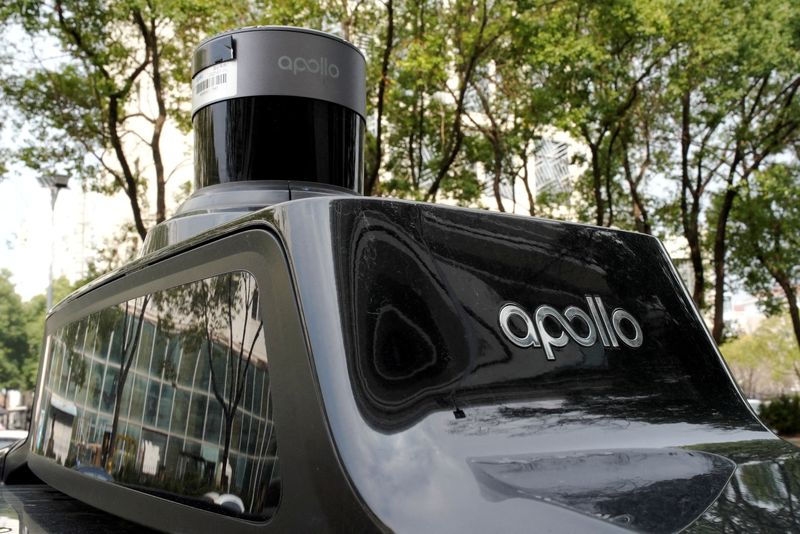By David Shepardson
WASHINGTON (Reuters) -The United States is opening an investigation into whether Chinese vehicle imports pose national security risks and could impose restrictions due to concerns about "connected" car technology, the White House said on Thursday.
The U.S. Commerce Department probe is needed because vehicles "collect large amounts of sensitive data on their drivers and passengers (and) regularly use their cameras and sensors to record detailed information on U.S. infrastructure," the White House said.
As vehicles could "be piloted or disabled remotely" the probe will also look at autonomous vehicles.
"China's policies could flood our market with its vehicles, posing risks to our national security," President Joe Biden said in a statement. "I’m not going to let that happen on my watch."
White House officials told reporters it was too early to say what action might be taken and said there was no decision on a potential ban or restrictions on connected Chinese vehicles.
Officials told reporters the U.S. government has wide legal powers and could take action with a potentially "large impact".
Biden called the effort an "unprecedented action to ensure that cars on U.S. roads from countries of concern like China do not undermine our national security."
The Alliance for Automotive Innovation, a trade group representing General Motors (NYSE:GM), Toyota, Volkswagen (ETR:VOWG_p) and nearly all major automakers, said the Commerce Department should "work closely with the auto industry to determine the scope of any action."
The group urged the Commerce Department to target transactions that pose "undue risk to U.S. economic and national security" but don't "capture low-risk transactions that could have unintended near-term impacts on advanced vehicle safety technologies."
There are relatively few Chinese-made light duty vehicles being imported into the United States. Commerce Secretary Gina Raimondo said the administration was taking action before they become widespread and "potentially threaten our privacy and national security."
Chinese EV makers have been counting on Southeast Asia, the Middle East and Europe as their largest exporting markets. BYD, the world's largest EV maker by sales, has repeatedly said it has no plan to sell its cars in the U.S. market, but on Wednesday said it was looking for a location in Mexico to locate a plant to build cars for that market.
BYD also said Wednesday it would begin selling its Dolphin Mini EV in Mexico at 358,800 Mexican pesos ($21,019.33), less than half the price of the cheapest Tesla (NASDAQ:TSLA).
The Chinese foreign ministry on Friday said Chinese cars were popular globally not because of "so-called unfair practices" but because they had emerged out of fierce market competition and were technologically innovative.
"China urges the US to respect the laws of the market economy and principles of fair competition, stop overstretching the concept of national security, stop its discriminatory suppression of Chinese companies and uphold an open fair and non-discriminatory business environment," ministry spokesperson Mao Ning told a regular press briefing.
Among all vehicles equipped with intelligent sensors, it is unfair to target cars from a specific country and impose restrictions on them exclusively, said Cui Dongshu, secretary general of China Passenger Car Association.
Separately, the Biden administration is considering imposing new tariffs on Chinese-made vehicles and officials face new pressure to restrict Chinese electric vehicle imports from Mexico.
The U.S. has adopted rules designed to wean the U.S. electric vehicle battery chain away from China and excluded companies and consumers from tax benefits if they include materials in their supply chains from China, which dominates the EV battery supply chain.
Last December, China said that violated international trade rules and would disrupt global supply chains.
In November, a bipartisan group of U.S. lawmakers raised alarms about Chinese companies collecting and handling sensitive data while testing autonomous vehicles in the United States.
The Commerce Department will seek comments for 60 days and then consider drafting regulations to address concerns. The probe will also seek details about current U.S.-assembled vehicles including where automakers license software.
The United States previously barred Chinese telecom companies from its market citing concerns about data, and designated Huawei and ZTE (HK:0763) as threats, requiring U.S. carriers to remove their equipment from U.S. networks.
The White House said China poses significant restrictions on U.S. autos and other foreign autos operating in China. "Why should connected vehicles from China be allowed to operate in our country without safeguards?" Biden said.
China has in recent years strengthened its oversight over data management within the country and most industries must apply for permission before data can be transferred abroad.
In May, authorities tightened data rules for the auto industry and proposed to ban smart vehicles in China from transferring data directly abroad, pushing them instead to use domestic cloud services.
($1 = 17.0700 Mexican pesos)
